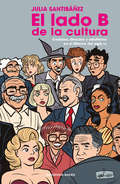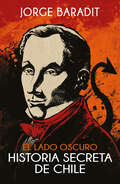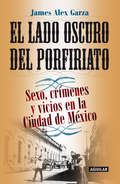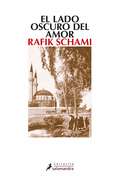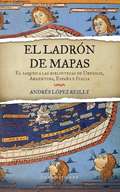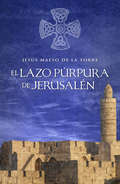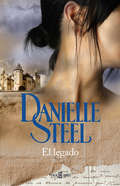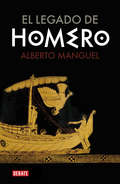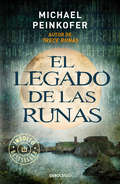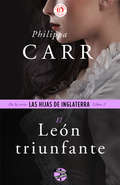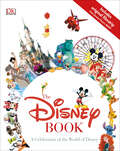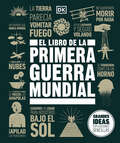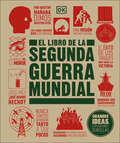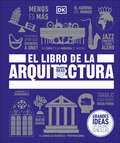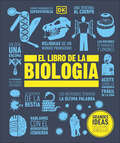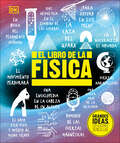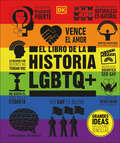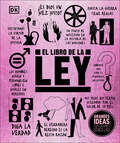- Table View
- List View
El lado b de la cultura: Codazos, descaro y adulterio en el México del siglo XX
by Julia SantibáñezPasa, lectora, lector, estás en tu fiesta. Más que un libro, este objeto es un carnaval de cincuenta estaciones que desfila tras las bambalinas de la cultura mexicana. En él participan Tin Tan y Pita Amor, María Félix y Monsiváis, Piporro y Tongolele, Nahui Olin y Jorge Ibargüengoitia, los beats y Marilyn Monroe, Vitola y José Revueltas. Entre muchos, muchos otros. Mientras pasan, nos van contando de sus vicios, supersticiones, sus pleitos y apodos, los cuadrángulos amorosos que formaron y los cabarés que visitaron. Guiados por la insaciable curiosidad de Julia Santibáñez, nos enteramos de quiénes fueron huéspedes de Lecumberri y quiénes invitados a la casa de Carlos Fuentes; qué escritores la hicieron de actores y qué libros y películas gozaron de la mercadotecnia inversa de la censura y por qué. Encuentra aquí lo que los libros ceremoniosos nunca dirán sobre escritores, artistas e intelectuales.
El lado oscuro de la historia de Chile
by JORGE BARADITEn la línea de su exitosa saga de divulgación histórica, el escritor Jorge Baradit observa aquellos episodios más escabrosos de la historia de Chile y nos relata de qué modo la maldad se ha hecho parte de procesos políticos y sociales desde el origen de la república. ¿Cómo contar nuestra historia sin asumir los periodos más oscuros? Jorge Baradit selecciona siete momentos en la historia de Chile y los retrata en su estilo. Los albores de la Independencia, el gobierno de Alessandri, el rol del argentino José de San Martín, Carlos Ibáñez del Campo y sus políticas, la persecución de los nazis que llegaron a Chile, la figura de Diego Portales y el actuar de la Dina desfilan en estas páginas como parte del lado b de una historia que no siempre nos llena de orgullo, sino que también de vergüenza.
El lado oscuro del Porfiriato
by Garza James AlexSexo, crímenes y vicios en la Ciudad de México. James Alex Garza retrata a la ciudad de México de principios del siglo pasado, con sus calles que escapan a una aparente y desigual opulencia, y revive a los personajes que la llenaron de historias dignas de una novela de suspenso o de terror. Este libro ofrece una breve caminata por la Ciudad de México y nos revela una realidad criminal gestada durante cien años. En este libro se retoman algunos de los crímenes más sonados del Porfiriato: se relatan episodios de desamor y crímenes pasionales; se ahonda en una psique como la de "El Chalequero", asesino en serie; se desenmascara la red de complicidad de una banda asaltantes y se conocen las alianzas corruptas de la policía. El lado oscuro del Porfiriato explora el lado oscuro de una ciudad que pugnaba por entrar a la modernidad al tiempo que se regodeaba en un régimen a la antigua usanza, regido por veleidades de toda índole, a la vez autoritario y aristocrático.
El lado oscuro del amor
by Rafik SchamiUn impresionante mosaico de Oriente Próximo, desde el fin del imperio Otomano hasta nuestros días, un panorama de enfrentamientos y revueltas, tramas secretas y dictaduras que abarca desde Siria al Líbano, pasando por la diáspora en Arabia, Europa y América. Corre la década de los sesenta en Damasco cuando el joven Farid conoce a la hermosa e inteligente Rana. La atracción mutua es irresistible, pero, para su desgracia, pertenecen a familias cristianas que se odian a muerte: los Mushtak, católicos, y los Shahin, de tradición greco-ortodoxa. Desde el primer momento, la relación entre los jóvenes se convierte en un desafío inaceptable a la ley de los clanes rivales, un amor condenado a la clandestinidad y el exilio. La suerte de los amantes a lo largo de varias décadas concita una nutrida galería de personajes difíciles de olvidar. Y como formidable marco de esta historia está Damasco, ciudad misteriosa y fascinante, quepalpita en estas páginas a través de una visión íntima pero certera de una cultura marcada por las convulsiones políticas y religiosas, y de un mundo en el que el valor del individuo queda relegado ante el poder omnipresente de la familia. Reseñas:«Un fresco épico, una alfombra oriental en la que los hilos de innumerables destinos individuales se entretejen formando un diseño en el que vive el crisol de las estirpes, religiones y culturas de Oriente Próximo.»Claudio Magris «Una obra maestra. Una prosa maravillosa, en la que se entremezclan mito, fábula y una magnífica historia de amor.»Die Zeit
El ladrón de café
by Tom HillenbrandIntriga, conspiraciones, secretos y persecuciones en una emocionante novela de aventuras, El ladrón de café también es un retrato fascinante de una época efervescente: la Europa de finales del siglo XVII. 1683. El Rey Sol gobierna con mano férrea desde el fastuoso palacio de Versalles. La Compañía Holandesa de las Indias Orientales es la empresa privada más poderosa del mundo. Los sabios e investigadores del continente intercambian por carta ideas y nuevos descubrimientos que revolucionarán la ciencia, la tecnología y el pensamiento. Y sentarse en un café para degustar una cara y exótica infusión, el kahvesi, se ha convertido en el pasatiempo más popular en las capitales europeas. Pero el verdadero negocio del café -su cultivo y su comercio- está controlado únicamente por los turcos. Algo que los comerciantes más importantes de Europa no piensan seguir consintiendo. Obediah Chalon, un joven y brillante inglés, científico y filósofo apasionado, ingresa en una durísima cárcel de Ámsterdam tras falsificar unas letras de cambio. Poco después un misterioso personaje le ofrece la libertad y una cuantiosa recompensa a cambio de una empresa arriesgada en la que podría perder la vida: robar una planta de café a los turcos. Para ello tendrá que poner a prueba todo su ingenio, acudir a sus contactos entre los sabios e intelectuales del continente, reclutar a los mejores «expertos» e iniciar un viaje a lo desconocido, sin saber que ha despertado las sospechas de gente importante. Una misión delicada y peligrosa.Un plan audaz.Un viaje plagado de aventuras.Y un robo que cambió la historia de Europa.Una trepidante novela histórica. El ladrón de café es una magnífica novela histórica que combina magistralmente la crónica de un robo audaz, plagado de aventuras, intrigas, conspiración, persecuciones y una pizca de amor, con un retrato espléndido de una época donde el avance de las ideas, el conocimiento y los ingenios mecánicos de todo tipo empezaba a cambiar el rumbo de la Historia.
El ladrón de café
by Tom HillenbrandIntriga, conspiraciones, secretos y persecuciones en una emocionante novela de aventuras, El ladrón de café también es un retrato fascinante de una época efervescente: la Europa de finales del siglo XVII. 1683. El Rey Sol gobierna con mano férrea desde el fastuoso palacio de Versalles. La Compañía Holandesa de las Indias Orientales es la empresa privada más poderosa del mundo. Los sabios e investigadores del continente intercambian por carta ideas y nuevos descubrimientos que revolucionarán la ciencia, la tecnología y el pensamiento. Y sentarse en un café para degustar una cara y exótica infusión, el kahvesi, se ha convertido en el pasatiempo más popular en las capitales europeas. Pero el verdadero negocio del café -su cultivo y su comercio- está controlado únicamente por los turcos. Algo que los comerciantes más importantes de Europa no piensan seguir consintiendo. Obediah Chalon, un joven y brillante inglés, científico y filósofo apasionado, ingresa en una durísima cárcel de Ámsterdam tras falsificar unas letras de cambio. Poco después un misterioso personaje le ofrece la libertad y una cuantiosa recompensa a cambio de una empresa arriesgada en la que podría perder la vida: robar una planta de café a los turcos. Para ello tendrá que poner a prueba todo su ingenio, acudir a sus contactos entre los sabios e intelectuales del continente, reclutar a los mejores «expertos» e iniciar un viaje a lo desconocido, sin saber que ha despertado las sospechas de gente importante. Una misión delicada y peligrosa.Un plan audaz.Un viaje plagado de aventuras.Y un robo que cambió la historia de Europa.Una trepidante novela histórica. El ladrón de café es una magnífica novela histórica que combina magistralmente la crónica de un robo audaz, plagado de aventuras, intrigas, conspiración, persecuciones y una pizca de amor, con un retrato espléndido de una época donde el avance de las ideas, el conocimiento y los ingenios mecánicos de todo tipo empezaba a cambiar el rumbo de la Historia.
El ladrón de mapas: El saqueo a las bibliotecas de Uruguay, Argentina, España e Italia
by Andrés López ReillyUna crónica real sobre un hecho que parece ficción: un ladrón uruguayo que robó mapas de inestimable valor, perteneciente a una organización especializada en el tráfico de obras de arte. Una trincheta escondida en un estuche de lentes, un falso carné de investigador y una cara de piedra fueron los artilugios para concretar un robo de mapas incunables -impresos entre 1453 y 1500- de inestimable valor. El monto del atropello en la Biblioteca Nacional de España en 2007 y el modo sin precedentes en que se concretó destaparon una red delictiva con ramificaciones en varios continentes y vinculación con la mafia que se extiende al día de hoy. ¿El ladrón? Un uruguayo que perpetró sus artes también en su tierra y, pese a todo, sigue descansando en un country bonaerense. La trama parece de novela, pero es tan real como vertiginosa, y la cuenta magistralmente el periodista Andrés López Reilly. La investigación, que le llevó años de labor, comenzó con la visita de un misterioso informante. De allí en más, el cronista persiguió las huellas del usurpador de mapas por el Río de la Plata, se encontró con que los cerebros de la organización habían desfilado por Montevideo incluso con acreditaciones del Vaticano, se topó con inescrupulosos libreros y falsos directores de museos, para comprobar finalmente la escasa protección de ese acervo tan rico y que en parte se perdió para siempre.
El lago
by E. L. Doctorow Iris MenéndezEl héroe de esta brillante novela de E.L. Doctorow, el maestro de las letras americanas, es Joe, un joven que escapa de la Gran Depresión. Huye de su hogar en Patterson, New Jersey a la ciudad de Nueva York y aprende la cruda realidad de la vida antes de seguir su ruta con unos feriantes. En una noche de verano está solo y temblando de frío, intentando dormir al lado de unas vías de ferrocarril en las montañas de Adirondack, cuando por su lado pasa un vagón privado. Su interior está iluminado y a través de las ventanas puede ver a varios hombres bien vestidos sentados a una mesa y, en otro compartimiento, a una hermosa mujer desnuda que sostiene un vestido blanco mientras se observa en un espejo. A partir de esa noche, Joe seguirá las vías hasta la misteriosa propiedad de Loon Lake, donde encontrará a la chica además de a sus acompañantes: un empresario de éxito, un aviador, un poeta borracho y un grupito de gángsters.Así se presenta el escenario para una cautivadora historia de misterio y amenaza, avaricia y ambición, lujuria desatada y tierno amor que desnuda las profundidades más oscuras del corazón humano y el lado "pesadillesco" del sueño americano. E.L. Doctorow ha escrito una novela que brilla con pasión y poesía, iluminada por la antorcha de la humanidad y la historia, el horror y la verdad.
El largo sendero de Texas (¡Arriba la Lectura!, Level U #51)
by Loretta West John Manos Diana Kizlauskas Natalie WestTras perder a sus padres a causa de la fiebre amarilla, Paula empieza a vestirse y a comportarse como un niño para poder acompañar a su abuelo en el viaje de transporte de ganado. ¿Volverá algún día su vida a la normalidad? NIMAC-sourced textbook
El lazo púrpura de Jesusalén
by Jesús Maeso de la TorreLa fascinante e ignorada historia de la orden de Monte Gaudio, una hermandad de caballeros que nació en la época de las Cruzadas para combatir junto a templarios y hospitalarios en Tierra Santa. ¿Qué enigmático nexo conecta un juicio sumarísimo a un templario en Carcasona, un robo sacrílego en el New Temple de Londres y la desaparición del Lazo Púrpura del califa Uzman? La respuesta la tienen cuatro personas, de distintos orígenes, pero unidos por una intensa, a veces perpleja, fe en su papel: un navarro arrastrado a Oriente por una promesa, un comendador de las finanzas del Temple, un guerrero musulmán de la secta de los drusos y una bella y extraña adivinadora egipcia. Juntos se verán arrastrados al borde del precipicio en su loca carrera por recuperar la huella de un arcano secular. A través de un enérgico tejido novelesco de historias cruzadas, en las que todos son sospechosos, el lector asiste a las luchas por el poder en el decadente reino de Jerusalén, las conspiraciones de los arquitectos de la Fede Sancta, la aparición de los enigmáticos cagots, los constructores leprosos de las catedrales, y al enfrentamiento bélico entre Saladino y los reyes cristianos. Con estos elementos Jesús Maeso traza un espléndido fresco del mundo de las Cruzadas, un colorista recorrido por los paisajes físicos y humanos de Navarra, Provenza y Oriente Próximo: lujosos palacios, castillos medievales, leproserías, mezquitas, galeras templarias... y las cortes de Balduino el Leproso, Saladino, la Roma papel y la Bizancio imperial, en una novela tan intensa como vivaz, tan rigurosa como apasionante. Reseña:«Uno de los grandes de la novela histórica española.»Qué Leer «Tras leerla con avidez, no me queda más que confirmar que es uno de los nombres imprescindibles de la narrativa española de este principio de siglo XXI.»Daniel Heredia, Diario de Cádiz
El legado
by Danielle SteelEn menos de una semana, Brigitte Nicholson se queda sin novio, sin trabajo y sin ganas de seguir con el libro que está escribiendo. Angustiada ante un futuro incierto, se traslada a Nueva York para estar con su madre y accede a ayudarla en la reconstrucción de la genealogía familiar. Entonces Brigitte descubrirá que por sus venas corre sangre india, ya que es la descendiente de la marquesa de Marguerac, cuyo nombre era Wachiwi, y que yace enterrada en la Bretaña.Cuando viaja hasta París para seguir investigando, Brigitte conoce a un apuesto profesor de la Sorbona que le ayudará a descifrar las pistas para saber cómo una princesa sioux acabó cruzando el Atlántico, en pleno siglo XVIII, de la mano de un noble francés que la introdujo en la Corte de Luis XVI y María Antonieta.Con Legado, Danielle Steel nos ofrece dos historias de amor unidas por un legado familiar: la valentía y el coraje para arriesgarse a abandonarlo todo con tal de vivir el amor verdadero.
El legado de Homero
by Alberto ManguelAlberto Manguel, Premio Formentor de las Letras 2017, disecciona la Ilíada y la Odisea de Homero para demostrarnos cuán importantes han sido en la construcción de la cultura occidental. A pesar de contar con varias biografías y que unas cuantas ciudades se disputen su nacimiento, no hay vestigios que puedan acreditar con seguridad la existencia de un hombre llamado Homero. Y sin embargo, no hay duda de que las obras reunidas bajo su autoría constituyen la piedra angular sobre la que descansa la literatura occidental. La Ilíada y la Odisea, con sus dioses fieramente humanos, constituyen la narración de las dos grandes metáforas que nos definen a través de los siglos: la vida como lucha y la vida como viaje. Sin importar si estos textos son alegóricos o si pretenden ser testimonio histórico de una época extinta, el rapto de Helena, el caballo de Troya, la cólera de Aquiles, el cíclope, Ulises y Penélope... han alimentado nuestra imaginación durante más de dos mil quinientos años, sirviendo de inspiración a autores posteriores de todas las épocas y geografías: Platón, Virgilio, al-Farabi, San Agustín, Avicena, Dante o Joyce, entre muchos otros. Con erudición prodigiosa, Manguel persigue el legado de Homero a través de las cimas literarias de todos los tiempos, ofreciéndonos este maravilloso libro con el que nos muestra que las pasiones que laten en ambos poemas son sentimientos comunes a toda la humanidad.
El legado de la villa de las telas
by Anne JacobsUna poderosa familia.Una situación dramática.Una mansión que esconde más de un secreto... La brillante tercera parte de la saga superventas que comenzó con La villa de las telas. Augsburgo, 1920. El estado de ánimo en la villa es optimista respecto al futuro. Paul Melzer ha regresado del frente y toma las riendas de la fábrica decidido a que el negocio familiar recupere su antiguo esplendor. Las cosas van bien incluso para su hermana Elizabeth, que regresa a casa ilusionada con un nuevo amor. Pero «felices para siempre» puede estar aún lejos para los Melzer. Marie, la joven esposa de Paul, quiere cumplir un viejo sueño: tener su propio taller de moda. A pesar de que sus modelos y sus diseños gozan de éxito, su alegría se ve empañada por las constantes discusiones con su marido. Incapaz de soportarlo más, Marie, la mujer que mantuvo a flote la fábrica, la villa y a toda la familia cuando más la necesitaron, toma una dura decisión y abandona la mansión junto a sus hijos. Reseñas de La villa de las telas:«Es una gran historia de amor, con tintes dramáticos y secretos familiares, que nos ha gustado tanto por su calidad literaria como por su preciosismo histórico.»Revista Kritica «Una novela histórica muy entretenida que capta el ambiente de comienzos del siglo XX.»Fränkische Nachrichten «Amor imposible y las rígidas normas sociales de la Europa central a principios del siglo XX serán el escenario en el que se desenvuelva esta entretenida historia llena de secretos.»Jorge Pato García, El Imparcial «Downtown Abbey en Augsburgo.»Histo-couch «Este libro lo tiene todo, todo que podríamos desear para un día de lluvia: una gran historia de amor, intriga [...] y un gran secretofamiliar.»Delmenhorster Kreisblatt «Con su escritura fluida, Anne Jacobs sabe cómo seducir a sus lectoras y transportarlas a la vida de la alta sociedad de hace cien años con todo su glamour pero también con sus sombras.»Weilheimer Tagblatt En los blogs...«El estilo ameno y sencillo de la autora, la intensidad de las emociones, la pasión que mueve a sus personajes y el esmerado contexto histórico componen una atractiva lectura, de las que conmueven y cautivan a lo largo de todas sus páginas.»Blog Me gustan los libros «Las geniales descripciones de los espacios y la evolución psicológica que nos regala la aclamada autora Anne Jacobs hacen de esta novela toda una delicia que nos lleva a reflexionar sobre la diferencia de clases sociales.»Blog La Petita Librería «Una novela de lectura muy viva que despierta rápidamente el interés del lector y en la que este queda atrapado intentando desvelar los múltiples enredos que plantea.»Blog Bookeando con Mª Ángeles «La villa de las telas es una saga familiar que atrapa, emocionante y muy entretenida, que me ha hecho disfrutar muchísimo.»Blog Adivina quién lee «Las intrigas y los secretos se suceden, como piezas de un puzle, que poco a poco nos permiten vislumbrar una verdad demasiado abrumadora para los habitantes de esa casa.»Blog Forjada entre sueños «Ideal para perderse entre sus páginas en una de estas tardes de frío, con todos los ingredientes necesarios para enganchar al más escéptico.»Blog Entérate de lo último
El legado de la villa de las telas
by Anne JacobsUna poderosa familia.Una situación dramática.Una mansión que esconde más de un secreto... La brillante tercera parte de la saga superventas que comenzó con La villa de las telas. Augsburgo, 1920. El estado de ánimo en la villa es optimista respecto al futuro. Paul Melzer ha regresado del frente y toma las riendas de la fábrica decidido a que el negocio familiar recupere su antiguo esplendor. Las cosas van bien incluso para su hermana Elizabeth, que regresa a casa ilusionada con un nuevo amor. Pero «felices para siempre» puede estar aún lejos para los Melzer. Marie, la joven esposa de Paul, quiere cumplir un viejo sueño: tener su propio taller de moda. A pesar de que sus modelos y sus diseños gozan de éxito, su alegría se ve empañada por las constantes discusiones con su marido. Incapaz de soportarlo más, Marie, la mujer que mantuvo a flote la fábrica, la villa y a toda la familia cuando más la necesitaron, toma una dura decisión y abandona la mansión junto a sus hijos. Reseñas de La villa de las telas:«Es una gran historia de amor, con tintes dramáticos y secretos familiares, que nos ha gustado tanto por su calidad literaria como por su preciosismo histórico.»Revista Kritica «Una novela histórica muy entretenida que capta el ambiente de comienzos del siglo XX.»Fränkische Nachrichten «Amor imposible y las rígidas normas sociales de la Europa central a principios del siglo XX serán el escenario en el que se desenvuelva esta entretenida historia llena de secretos.»Jorge Pato García, El Imparcial «Downtown Abbey en Augsburgo.»Histo-couch «Este libro lo tiene todo, todo que podríamos desear para un día de lluvia: una gran historia de amor, intriga [...] y un gran secretofamiliar.»Delmenhorster Kreisblatt «Con su escritura fluida, Anne Jacobs sabe cómo seducir a sus lectoras y transportarlas a la vida de la alta sociedad de hace cien años con todo su glamour pero también con sus sombras.»Weilheimer Tagblatt En los blogs...«El estilo ameno y sencillo de la autora, la intensidad de las emociones, la pasión que mueve a sus personajes y el esmerado contexto histórico componen una atractiva lectura, de las que conmueven y cautivan a lo largo de todas sus páginas.»Blog Me gustan los libros «Las geniales descripciones de los espacios y la evolución psicológica que nos regala la aclamada autora Anne Jacobs hacen de esta novela toda una delicia que nos lleva a reflexionar sobre la diferencia de clases sociales.»Blog La Petita Librería «Una novela de lectura muy viva que despierta rápidamente el interés del lector y en la que este queda atrapado intentando desvelar los múltiples enredos que plantea.»Blog Bookeando con Mª Ángeles «La villa de las telas es una saga familiar que atrapa, emocionante y muy entretenida, que me ha hecho disfrutar muchísimo.»Blog Adivina quién lee «Las intrigas y los secretos se suceden, como piezas de un puzle, que poco a poco nos permiten vislumbrar una verdad demasiado abrumadora para los habitantes de esa casa.»Blog Forjada entre sueños «Ideal para perderse entre sus páginas en una de estas tardes de frío, con todos los ingredientes necesarios para enganchar al más escéptico.»Blog Entérate de lo último
El legado de las runas
by Michael PeinkoferLa esperada continuación de Trece runas, el gran éxito de Michael PeinkoferEdimburgo, 1826. Quentin Scott y su esposa, Mary, han llegado de Nueva York desolados por una terrible noticia: su tío, sir Walter Scott, ha muerto como consecuencia de un tiroteo. En Abbostford, la mansión familiar, que Quentin ha heredado, les comunican que el cuerpo del célebre escritor ha desaparecido. Este es solo el primero de una cadena de extraños acontecimientos que los llevarán a investigar quién quería ver a su tío muerto, y es que el perspicaz sir Walter Scott conocía un secreto que se remonta a la dinastía de la casa Estuardo y que ha perdurado a través de una misteriosa hermandad que conspira para lograr la independencia de Escocia. Quentin y Mary son las únicas personas que pueden truncar sus planes. Ahora el futuro de toda la nación está en sus manos. Una hermandad clandestina que amenaza desde las sombras Un secreto centenario oculto en las ruinas de un castillo La lucha aún no ha terminado
El león triunfante
by Philippa Carr Ariel BignamiLe dicen "el león". Se llama Jake Pennlyon, el imponente y varonil bucanero al servicio de su Majestad británica. El siguiente abordaje es el corazón Catharine Farland. Obligada a un matrimonio de conveniencia, atormentada por los recuerdos del amor juvenil que resultó prohibido, Catharine se jura que huirá de su destino. Pero los tempestuosos tiempos de Isabel I le traen una sorpresa, cuando la hacen prisionera en un galeón español... sin siquiera sospechar que ella es un peón en el ajedrez de venganza de un hombre.A través de la enemistad de los reinos de España e Inglaterra hasta los días de la legendaria derrota de la Armada Invencible, la novela sigue los pasos de Catharine desde el arrebato de la primera pasión hasta la ferocidad de un amor de madre. Y a pesar de todas las peripecias, Catharine descubrirá que su corazón está por siempre ligado al de un bucanero seductor.
El libertino de Hidden Brook
by Antonia Romagnoli María Angela MaraschiInglaterra, 1805 ¿Qué apariencia tendrá un libertino? ¿Un "verdadero" libertino? Es lo que Victoria se pregunta luego de años de lecturas prohibidas en el colegio, cuando descubre que junto a ella, en la ancestral propiedad de los Killmore, se aloja Jared Lennox, hermano de su cuñado y conocido libertino londinense. Herido en un duelo, el joven está prácticamente segregado en su cuarto... ¿qué mal podría hacer ir a verlo a escondidas para darle una mirada? La que debía ser una pequeña aventura sin consecuencias es solo el inicio de una serie de equívocos y malentendidos que parece conducir a la pareja, paso a paso, hacia un inexorable altar. ¿Pero será tan desagradable para los dos la idea de un matrimonio reparador? Bajo la mirada atenta de la formidable tía Erinia, determinada a separar lo que Dios todavía no ha unido si ella lo considera inadecuado, el de Victoria y Jared será un recorrido hacia el recíproco entendimiento, pero sobre todo, hacia una creciente consciencia de sí mismos. Un relato de otros tiempos. Una historia de amor fuera del tiempo. Una tía que todos quisieran tener.
El libro de Disney (The Disney Book, Centenary Edition): Nueva edicíon
by DK¡Celebra con nosotros 100 años de Disney!Recorre 100 años de mágicas historias, personajes entrañables, películas animadas y divertidos parques de atracciones. Esta edición actualizada y ampliada de El libro de Disney, incluye 50 nuevas páginas en las que se presentan las innovadoras creaciones que la compañía ha llevado a cabo en los últimos diez años: Encanto, Moana, Red, Coco, Soul y muchas más. Descubre cómo se hicieron las películas, sumérgete en la mente de sus creadores y analiza la evolución del maravilloso mundo de Disney. Diseño elegante y texto divertidoImpresionantes imágenes exclusivas de los Archivos de Walt Disney: fotos, pinturas, bocetos, ilustraciones y mucho másInformación e imágenes detrás de escena que revelan cómo se hicieron las películasUna línea de tiempo de la historia de Disney, desde 1923 hasta 2023Con este libro de Disney conocerás en profundidad los fascinantes mundos de Disney, Pixar, Marvel, Star Wars y 20th Century Studios, desde las comiquitas y películas hasta las atracciones y el merchandising. Disfruta de toda la información tras las cámaras tanto de los clásicos de tu infancia como de las últimas animaciones. El regalo perfecto para cinéfilos y fans de Disney.© 2024 Disney-------------------------------------------------------------------Celebrate 100 years of magical Disney storytelling.The ideal Disney gift book for movie buffs, this updated and expanded edition includes more than 50 new pages for Disney’s special 100th anniversary. Now including ten more years of magic, The Disney Book: New Edition features groundbreaking and record-breaking new creations—such as Walt Disney Animation Studios' Encanto and Moana, and Pixar Animation Studios' Turning Red, Soul, and Coco—and explores new parks, experiences, memorabilia, and much more. The Disney Book (New Ed) further features: Stylish and playful design with stunning visuals including stills, concept art and story sketches, showcasing exclusive access to archives, merchandise and ephemera.Behind-the-scenes information and images reveal how the movies were made.A visual timeline of the entire history of Disney, right up to 2023.Celebrate movie history and the worlds of Disney, Pixar, Marvel, Star Wars, and 20th Century Studios, from the animations and live-action movies to the global Disney parks and attractions. Go behind-the-scenes of Disney's beloved movies and find out how they were made, follow Disney's entire history using the timeline, delve into the incredible archives, wonder at fascinating collectibles, and marvel at beautiful concept art and original story sketches.The perfect children’s book aged 9-12 who want to know everything about the magical worlds of Disney.© 2024 Disney
El libro de la Primera Guerra Mundial (DK Big Ideas)
by DKDescubre las batallas, las tácticas militares y los momentos más decisivos de la Primera Guerra Mundial, Desde las crecientes tensiones entre las principales potencias europeas y el asesinato del archiduque Francisco Fernando hasta la entrada de Estados Unidos en la guerra y la creación de la Liga de Naciones, este libro de historia profundiza en las causas, las consecuencias y el desarrollo del acontecimiento histórico que definió el siglo XX.En su interior, encontrarás: Descripciones, datos, tablas, líneas temporales y gráficos que te proporcionarán una visión completa y global de las innovaciones logísticas, los acontecimientos clave y las batallas que tuvieron lugar durante el conflicto.Texto veraz, informativo y fácil de leer.Citas célebres de líderes militares, historiadores y políticos famosos.Repleto de mapas y fotografías que inmortalizan los diferentes escenarios de este conflicto bélico.¡Aprende cómo las grandes potencias y los avances tecnológicos y logísticos influyeron en el curso de uno de los conflictos militares más importantes de la historia, también conocido como «la guerra que acabaría con todas las guerras»!Este libro en español para todas las edades pertenece a la galardonada serie Grandes Ideas, que expone temas complejos de un modo fácil de entender mediante explicaciones claras y alejándose del academicismo tradicional. Su creativo diseño y los gráficos innovadores que acompañan al texto hacen de esta serie una introducción perfecta a una gran diversidad de temas. Discover the key battles, tactics, technologies, and turning points of the First World War – the epic conflict that was supposed to be "the war to end all wars."Combining authoritative, exciting text and bold explanatory graphics, The World War I Book explores the historical background to the war, its causes, key events, and aftermath.Using the original, graphic-led approach of the series, entries profile more than 90 of the key ideas and events during and surrounding the conflict – from the growing tensions between Europe’s major powers to the assassination of Archduke Franz Ferdinand, the German invasion of Belgium, the endless slaughter in the trenches, the American entry into the war, the Russian Revolution, the Armistice, and the creation of the League of Nations.Offering a uniquely compelling, accessible, and immediate history of the war, The World War I Book shows how certain key battles, individual leaders, political and economic forces, and technological advances influenced the course of the conflict.
El libro de la Segunda Guerra Mundial (DK Big Ideas)
by DKDiscover the key battles, tactics, technologies, and turning points of the Second World War - the epic conflict that shaped the modern world.Combining authoritative, exciting text and bold explanatory graphics, The World War II Book explores the causes, key events, and lasting consequences of the Second World War.Using the original, graphic-led approach of the series, entries profile more than 90 of the key ideas and events during and surrounding the conflict - from the rise of Hitler and Fascism in the 1930s to Pearl Harbor, the D-Day landings, and the bombing of Hiroshima to the founding of the State of Israel in 1948.Offering a uniquely compelling, accessible, and immediate history of the war, The World War II Book shows how key battles, political and economic forces, individual leaders, and technological advances influenced the course of the conflict.
El libro de la arquitectura (DK Big Ideas)
by DKDescubra los conceptos arquitectónicos clave que hay detrás de los edificios y estructuras más increíbles del mundo.'El libro de la arquitectura' va más allá de otros libros de arquitectura para analizar no solo los edificios en sí mismos, sino también las ideas y principios que hacen que cada una de estas estructuras sea tan importante para la historia y la evolución de nuestro entorno.Desde la arquitectura antigua y clásica a través de edificios medievales, góticos y renacentistas, la explosión de Barroco y Rococó y la "batalla de los estilos" del siglo XIX, hasta el surgimiento del modernismo, la posmodernidad y los listones brillantes de los rascacielos de los siglos XX y XXI, el libro traza la evolución de los edificios que nos rodean. Utilizando impresionantes infografías y "mapas mentales", nos muestra cómo los arquitectos han superado los límites y han creado edificios innovadores a lo largo de la historia. Se extraen ejemplos de movimientos y estilos arquitectónicos de todo el mundo: edificios célebres de Europa y América del Norte y del Sur aparecen junto a ejemplos clave de China, Japón e India e impresionantes estructuras religiosas: mezquitas, iglesias, estupas, pagodas y templos.Al ofrecer una nueva perspectiva sobre las construcciones de nuestro entorno, 'El libro de la arquitectura' es la guía esencial para todos los apasionados de los edificios y las ideas detrás de los mismos.Discover the key architectural concepts behind the world&’s most incredible buildings and structures.'El libro de la arquitectura' goes beyond other architecture books to analyze not just buildings themselves, but the ideas and principles that make each of the featured structures so important to the history and evolution of our built environment.From ancient and classical architecture through medieval, Gothic, and Renaissance buildings, the explosion of Baroque and Rococo, and the 19th-century &“battle of the styles,&” to the emergence of modernism, postmodernism, and the glittering skyscrapers of the 20th and 21st centuries, the book traces the evolution of construction. Using stunning infographics and mind-maps, it shows how architects throughout history have pushed boundaries and created innovative buildings. Examples of architectural movements and styles are drawn from all over the world. Celebrated buildings from Europe and North and South America feature alongside key examples from China, Japan, and India, and stunning religious structures from mosques to churches, and from stupas to pagodas and temples.Offering a fresh perspective on our manmade environment, The Architecture Book is the essential guide for everyone who is passionate about buildings and the ideas behind them.
El libro de la biología (DK Big Ideas)
by DKGrandes ideas, explicaciones sencillasEl libro de biología es una introducción cautivadora para comprender el mundo vivo, explica cómo funcionan los organismos e interactúan entre sí, ya sean microbios, hongos o mamíferos.Aquí descubrirá las áreas clave de las ciencias de la vida, incluidas la ecología, la zoología y la biotecnología, a través del datos interesantes y gráficos innovadores.- Más de 95 ideas y eventos clave para el desarrollo de la biología y las ciencias de la vida.- Repleto de hechos, cuadros, plazos y gráficos para ayudar a explicar los conceptos centrales.- Un enfoque visual para temas importantes con ilustraciones llamativas y gráficos en cada uno.- El texto claro hace que los temas sean accesibles y fáciles de comprender.Este libro describe grandes ideas biológicas, como los misterios del ADN y la herencia genética; y cómo aprendimos a desarrollar vacunas que controlan las enfermedades. Si pensaba que era difícil aprender sobre el mundo vivo, El libro de biología presenta información clave en un diseño fácil de seguir. Aquí aprenderá sobre la clonación, la neurociencia, la evolución humana y la edición de genes, y serán introducidos a los científicos que dieron forma a estos sujetos, como Carl Linnaeus, Jean-Baptiste Lamarck, Charles Darwin y Gregor Mendel.-------------------------------------------------------------------------------------------This captivating book will broaden your understanding of Biology, with:- More than 95 ideas and events key to the development of biology and the life sciences- Packed with facts, charts, timelines and graphs to help explain core concepts- A visual approach to big subjects with striking illustrations and graphics throughout- Easy to follow text makes topics accessible for people at any level of understandingThe Biology Book is a captivating introduction to understanding the living world and explaining how its organisms work and interact - whether microbes, mushrooms, or mammals. Here you'll discover key areas of the life sciences, including ecology, zoology, and biotechnology, through exciting text and bold graphics.This book will outline big biological ideas, like the mysteries of DNA and genetic inheritance; and how we learned to develop vaccines that control diseases. If you thought it was difficult to learn about the living world, The Biology Book presents key information in an easy to follow layout. Here you'll learn about cloning, neuroscience, human evolution, and gene editing, and be introduced to the scientists who shaped these subjects, such as Carl Linnaeus, Jean-Baptiste Lamarck, Charles Darwin, and Gregor Mendel.
El libro de la física (DK Big Ideas)
by DKGrandes ideas, explicaciones sencillasCon una prosa sencilla, El libro de la física presenta explicaciones claras y concisas que desbrozan la jerga especializada, diagramas que plasman complejas teorías, citas memorables e ingeniosas ilustraciones que juegan con nuestros conocimientos de la física.¿Cómo generan electricidad los imanes? ¿Qué es la antimateria? ¿Es posible viajar en el tiempo? A partir de estas y otras muchas preguntas, los físicos han ampliado las fronteras del conocimiento humano y nos han ayudado a comprender las leyes físicas que rigen nuestro mundo y el universo.Tanto el estudiante deseoso de aprender como el simple lector curioso acerca del funcionamiento del mundo encontrarán en este libro muchas ideas estimulantes.
El libro de la historia LGBTQ+ (DK Big Ideas)
by DKDescubra la rica y compleja historia del colectivo LGBTQ+ en todo el mundo: sus luchas, triunfos y contribuciones culturales.Este libro explora y detalla las ideas y eventos más importantes de la historia y la cultura LGBTQ+ y nos muestra así toda la experiencia LGBTQ+. Se trata de un relato diverso y global, que explora los momentos, movimientos y fenómenos más importantes, desde la primera poesía de amor lésbica conocida de Sappho hasta los estudios de sexualidad modernos de Kinseys, e incluye biografías de figuras clave, de Anne Lister a Allen Ginsberg.'El libro de la historia LGBTQ+' celebra las victorias y los triunfos de las personas LGBTQ+ a lo largo de la historia, como los disturbios de Stonewall y las primeras cirugías transgénero, además de commemorar acontecimientos trágicos y persecuciones, desde la "policía nocturna" del renacimiento italiano hasta las políticas "No preguntes, no digas" del siglo XX. También recoge elementos culturales clave - el lenguaje secreto de la cultura polari, la cultura de salas de baile negra y latinx y las muchas banderas de la comunidad - y resigue la historia de los espacios LGBTQ+, desde las "casas Molly" del siglo XVIII hasta "los barrios gay modernos.Con la combinación de de textos autorizados y accesibles y gráficos impactantes típica de la serie "Grandes ideas", 'El libro de la historia LGBTQ+' celebra la larga, orgullosa y a menudo oculta historia de las personas, culturas y lugares LGBTQ+ de todo el mundo.Discover the rich and complex history of LGBTQ+ people around the world-their struggles, triumphs, and cultural contributions.Exploring and explaining the most important ideas and events in LGBTQ+ history and culture, this book showcases the breadth of the LGBTQ+ experience. This diverse, global account explores the most important moments, movements, and phenomena, from the first known lesbian love poetry of Sappho to the Kinseys' modern sexuality studies, and features biographies of key figures from Anne Lister to Allen Ginsberg.'El libro de historia LGBTQ+' celebrates the victories and untold triumphs of LGBTQ+ people throughout history, such as the Stonewall Riots and first transgender surgeries, as well as commemorating moments of tragedy and persecution, from the Renaissance Italian "Night Police" to the 20th century "Don't Ask Don't Tell" policy. The book also includes major cultural cornerstones-the secret language of polari, Black and Latinx ballroom culture, and the many flags of the community-and the history of LGBTQ+ spaces, from 18th-century "molly houses" to modern "gayborhoods."Using the "Grandes ideas" series' trademark combination of authoritative, accessible text and bold graphics, The LGBTQ+ History Book celebrates the long, proud-and often hidden-history of LGBTQ+ people, cultures, and places from around the world.
El libro de la ley (DK Big Ideas)
by DKGrandes ideas, explicaciones sencillasUna completa introducción al mundo jurídico con explicaciones claras y concisas que presenta de forma accesible las nociones básicas del Derecho y las principales leyes y acontecimientos jurídicos que han marcado la historia e influenciado el cambio social. Ideal para obtener una visión general de los fundamentos del sistema legal que rige la sociedad.¿Cuándo se promulgaron los primeros códigos legales? ¿Para qué sirven las leyes? ¿Quién fue Ulpiano? ¿Dónde y por qué surgió la Carta Magna? Escrito en un lenguaje sencillo y comprensible para no juristas y con la ayuda de diagramas, líneas temporales, cuadros sinópticos e ingeniosas ilustraciones que descifran conceptos jurídicos complejos, El libro de la ley explora las leyes, sentencias judiciales y personajes clave de la historia legal, así como los códigos religiosos y morales que han forjado el mundo en que vivimos.Un libro de consulta imprescindible para jóvenes y adultos, estudiantes, juristas o legos en la materia, y cualquier persona que desee entender el ordenamiento jurídico, los derechos y deberes que emanan de él y aumentar su comprensión sobre la sociedad. La ley explicada de forma sencillaEl Derecho se remonta a las primeras civilizaciones y, como realidad social, es inseparable de nuestra vida cotidiana. El conocimiento de la ley y los instrumentos legales resulta imprescindible para entender no solo la realidad social, política y económica de nuestros días, sino también la historia y la civilización. Descubre las primeras leyes, como el Código de Hammurabi, el proceso hacia la abolición de la esclavitud o los movimientos que impulsaron la reforma laboral, la legalización de los sindicatos, el sufragio universal o los Convenios de Ginebra.Este libro de historia del Derecho ofrece un fascinante recorrido por los orígenes, evolución y consolidación del Derecho, desde sus primeras manifestaciones en forma de usos y costumbres al establecimiento de los primeros códigos, órganos jurisdiccionales y organismos internacionales que regulan la sociedad moderna con nuevas leyes como los derechos de autor, el matrimonio entre personas del mismo sexo o el "derecho al olvido". El libro de la ley nos enseña la evolución del Derecho a lo largo de los siglos, desde el código de Ur-Nammu, hace más de 4000 años, a los derechos digitales en la época actual: - Los inicios del Derecho: 2100 a.C - 500 a.C. - En Derecho en la Edad Media: 500-1470 - Imperio e Ilustración: 1470-1800 - El imperio de la ley: 1800-1945 - Un nuevo orden internacional: 1945-1980 - El Derecho en el mundo actual: A partir de 1980
